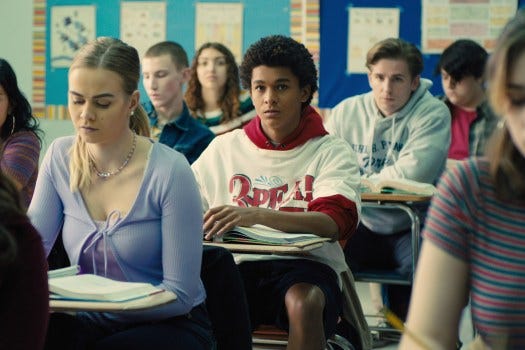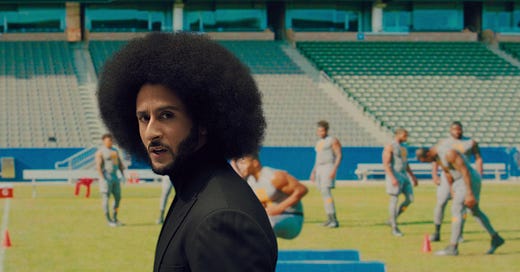I want to like Colin in Black and White, Netflix’s dramatization of civil rights’ activist Colin Kaepernick’s teen years that was created by the man himself and Ava DuVernay. (You might remember Kaepernick as that one NFL quarterback who started a wave of kneeling during the anthem as a sign of protest against racism in 2016, and who suffered the consequences.) But I’m not sure it wants to be liked.
The opening minutes of episode one, “Cornrows”, doesn’t greet us with the young Kaepernick (played with a delightfully earnest, awkward energy by Jaden Micheals). Instead, we meet the actual adult, replesdent in a trench coat and crowned with his typically majestic afro, who introduces himself by laying out the innate dehumanisation of life as a football player.
“Coaches will tell you they’re looking for warriors, beasts, killers. And you want to give them that. They say they want you to be an animal,” he says, against the backdrop of countless athletic, passionate young men glamorously training on the football field. “What they don’t want you to understand is what’s being established is a power dynamic.”
That’s when things get a little more complicated, and a whole lot blunter, as the scene cuts between NFL trials and an old Southern man rattles off the prices of these strapping young men on the block. Chattel slavery, the NFL is.
…Obviously, nobody is literally calling football slavery. Kaepernick is using shocking, graphic parallels to actually make people think where they’d usually glide right over. To not blatantly absorb the commodification of Black bodies, but to actually wonder how far our society has come. It’s a good place to start a conversation.
And at first, you’d think it’s totally unfitting, far too extreme, for the show that follows. Young Kaepernick, an adopted biracial Black boy raised by clueless White parents, is trying to understand a culture he hasn’t quite realized how isolated he feels from. He wants the food, he wants the clothes, and, as the episode title makes clear, he wants the cornrows. He views none of this as any kind of political statement, but as a teenager’s innocent exploration, an attempt to emulate his idol, basketball player Allen Iverson.
He is woefully unprepared for what he’s getting himself into. Cornrows aren’t copacetic, because 2000s America really was—and let’s be honest, is still—like that. Natural hair equals thuggery says the media, equals being “unprofessional” says his parents, equals every different synonym that Black culture is bad. (His coach, his father says, will kick him off the team.) As Colin clings to his naivety, he’s teetering right on the edge of the exact sentiments Allen Iverson himself faced. The entire episode balances on that tightrope, between the idealistic world Colin is edging his way out of and the reality he’s crashing straight into: a world where a Black man starts a show about his childhood by comparing the NFL to slavery.
It’s not an elegant balance. There’s a spot of hope when Colin’s mother withstands the world’s cringiest conversation and a drive on the other side of the tracks to take her son to a professional Black barbershop that can actually do his hair how he’d like. This is followed by a swift kick in those yanked heartstrings when she takes him to the barber’s house for some more cornrowing, only for her to be scared off by her son eagerly partaking in and liking culturally Black food and hip-hop music. (And also, the most frightening thing of all: Lesbians!) She runs off, cowed, abandoning her fourteen-year-old son for hours at a strange woman’s house.
Colin sees nothing strange about this, even as anyone over the age of eighteen watches this with sirens blaring, and floats on, elated by his freshly pristine braids. Later, when the coach does, actually, threaten to kick him off the team if he doesn’t chop the locks, Mom and Dad’s quiet, level insistences on following the heretofore unspoken “rules” are deafening to the bemused boy.
Then, Mom tells him that he looks like a thug.

I don’t think the real Colin Kaepernick made that up. I don’t think he dramatized that. I think he’s held that conversation, that sentence she dropped on him like a boulder into a still and quiet pond, in him for many years, because that’s the kind of thing you would never forget your mother saying.
This doesn’t feel like a show you like. This feels like a show that is very angry, and as you’ve bothered to give it the time of day, it is desperate to not waste it. It’s using Colin’s childhood as a framing device for these lessons because this is when he learned them. Not when he got blacklisted from the NFL, but when he let his mom get his braids chopped off at Supercuts so he wouldn’t look like a thug—a word Kaepernick, playing footage of January 6th insurrectionists and rioters being carefully labeled “protestors” and “people”, takes no small umbrage to.
Colin in Black and White has something to say. It can’t afford for you to miss it.1
Thanks to my brother, who, unfortunately, continues to be just about the only reason I follow through on anything.





